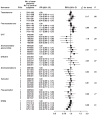Endogenous sex hormones and prostate cancer: a collaborative analysis of 18 prospective studies
- PMID: 18230794
- PMCID: PMC6126902
- DOI: 10.1093/jnci/djm323
Endogenous sex hormones and prostate cancer: a collaborative analysis of 18 prospective studies
Abstract
Background: Sex hormones in serum have been hypothesized to influence the risk of prostate cancer. We performed a collaborative analysis of the existing worldwide epidemiologic data to examine these associations in a uniform manner and to provide more precise estimates of risks.
Methods: Data on serum concentrations of sex hormones from 18 prospective studies that included 3886 men with incident prostate cancer and 6438 control subjects were pooled by the Endogenous Hormones and Prostate Cancer Collaborative Group. Relative risks (RRs) of prostate cancer by fifths of serum hormone concentration were estimated by use of conditional logistic regression with stratification by study, age at recruitment, and year of recruitment. All statistical tests were two-sided.
Results: No associations were found between the risk of prostate cancer and serum concentrations of testosterone, calculated free testosterone, dihydrotestosterone, dehydroepiandrosterone sulfate, androstenedione, androstanediol glucuronide, estradiol, or calculated free estradiol. The serum concentration of sex hormone-binding globulin was modestly inversely associated with prostate cancer risk (RR in the highest vs lowest fifth = 0.86, 95% confidence interval = 0.75 to 0.98; P(trend) = .01). There was no statistical evidence of heterogeneity among studies, and adjustment for potential confounders made little difference to the risk estimates.
Conclusions: In this collaborative analysis of the worldwide data on endogenous hormones and prostate cancer risk, serum concentrations of sex hormones were not associated with the risk of prostate cancer.
Figures




Comment in
-
Getting over testosterone: postulating a fresh start for etiologic studies of prostate cancer.J Natl Cancer Inst. 2008 Feb 6;100(3):158-9. doi: 10.1093/jnci/djm329. Epub 2008 Jan 29. J Natl Cancer Inst. 2008. PMID: 18230791 No abstract available.
-
Re: Endogenous sex hormones and prostate cancer: a collaborative analysis of 18 prospective studies.J Natl Cancer Inst. 2008 Oct 1;100(19):1412-3. doi: 10.1093/jnci/djn287. Epub 2008 Sep 23. J Natl Cancer Inst. 2008. PMID: 18812556 No abstract available.
-
Words of wisdom. Re: Endogenous sex hormones and prostate cancer: a collaborative analysis of 18 prospective studies.Eur Urol. 2009 Mar;55(3):750-1. doi: 10.1016/j.eururo.2008.11.048. Eur Urol. 2009. PMID: 19650234 No abstract available.
References
-
- Ferlay J, Bray F, Pisani P, Parkin DM. GLOBOCAN 2002: Cancer Incidence, Mortality and Prevalence Worldwide. Version 2.0. Lyon, France: IARC Press; 2004.
-
- Bostwick DG, Burke HB, Djakiew D, et al. Human prostate cancer risk factors. Cancer. 2004;101:2371–2490. - PubMed
-
- Hsing AW. Hormones and prostate cancer: what’s next? Epidemiol Rev. 2001;23:42–58. - PubMed
-
- Platz EA, Giovannucci E. The epidemiology of sex steroid hormones and their signaling and metabolic pathways in the etiology of prostate cancer. J Steroid Biochem Mol Biol. 2004;92:237–253. - PubMed
-
- Thompson IM, Goodman PJ, Tangen CM, et al. The influence of finasteride on the development of prostate cancer. N Engl J Med. 2003;349:215–224. - PubMed
Publication types
MeSH terms
Substances
Grants and funding
LinkOut - more resources
Full Text Sources
Medical

